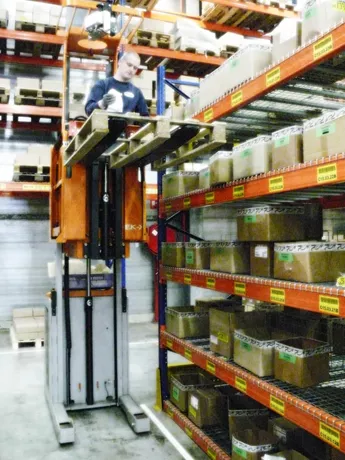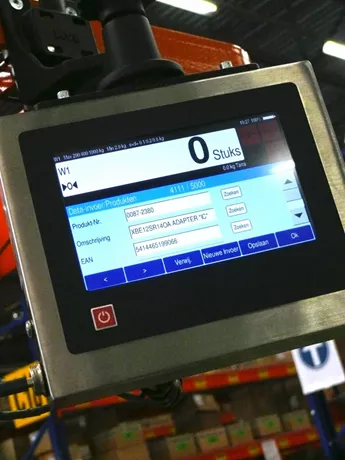“We have already reduced the error level in our picking from 2000 ppm to 800 ppm, but there’s a lot of pressure from America to get as close to 0 ppm as possible. So we want to give our people tools to make less errors.”
- Natacha Claessens, Warehouse Manager Gates Distribution Center

100 years of experience in powering progress
Gates is an American producer of power transmissions with over a hundred years of history under the belt. The company realizes several billion dollars of global turnover from belt drives, industrial hose and hydraulic connectors. These products are sold to the automotive industry, oil and gas, and a range of other industries, both as first fit and for the after market.
Near Gent, Belgium, Gates operates two large Distribution Centers, situated close to each other. From these DCs Gates ships orders to customers all over Europe. Natacha Claessens is the Warehouse Manager: “Our two DC’s ship about 400 orders per day, say 8,500 order lines. That amounts to 50 Tons of goods a day. To maintain this throughput, the largest of the two DCs works around the clock, five days a week, in three eight hour shifts.“
“In addition, the logistics are very complicated. Since we supply to distributors, but also to end users, to garages, the order size varies from small packages to full truck loads.”
Every picking error represents 125 Euro of cost
With any sizeable order pick activity, picking errors are a problem constantly battled. The Gates DC’s are pushed from the highest management levels to reduce their error rates. “Picking errors are a costly problem. Because of the loss of client satisfaction, but also because of very real cost: we have calculated that every picking error represents a cost of 125 Euro, from extra shipments and administrative handling.”
“We have already been able to reduce our error rate to 800 ppm at order line level, but there’s a lot of pressure from America to get as close to 0 ppm as possible. So we want to give our people tools to make less errors. The RAVAS mobile weighing system is such a tool.”

Considerable cost savings from checking the order lines by weight
At Gates the STILL order pick trucks are equipped with RAVAS weighing forks and an intelligent Touch screen weight terminal. The terminal has a database that contains the piece weights of all SKU’s in the DC’s. After the operator has picked the articles in the order line and added them tot the pallet on the scale forks, he scans the product’s barcode. This barcode scan identifies the article in the terminal’s database. The terminal then uses the article’s piece weight to translate the weight increase on the forks into a number of articles picked, and shows this number in the display. This allows the operator to check whether he has picked the correct number of articles. Any error is corrected at the spot where the cost is the lowest: at the picking slot.
Natacha Claessens: “Our business case for the weighing systems is based on the assumption that we will realize considerable cost savings, not only from reducing the number of picking errors, but also from eliminating final inspections. These are now carried out by one-and-a-half FTE’s which we can then deploy productively elsewhere. That will save an additional 60.000 Euro per year.”
Weighing systems go on-line with Red Prairie Dispatcher
The mobile weighing project still offers ample opportunity for optimization. “At the moment the weighing system still operates stand-alone. We use handhelds for communicating the orders to the operators. Next step will be to have the weight terminal communicate directly with our Dispatcher WMS, over our WLAN net. All hardware needed is already present on the weight terminals. In the end nearly every order picker in our fleet will be fitted with an on-line weighing system.”
“We have a successful cooperation with RAVAS, the interaction is very easy going. We have already gone through quite a development program with this project. All our request are considered, we really feel that RAVAS is a partner that thinks along with us.”

COMPANY
Gates
LOCATION
Gent, Belgium
APPLICATION
Order picking
Order picking
In order picking performance comes down to two things: speed and accuracy. Errors mean a burden on the organisation, because they cost time, money and goodwill. Weighing on order picking trucks helps preventing picking errors. If an error is signaled, the order picker can react immediately and correct the error where the cost is lowest: at the picking slot. If the integrated scale is used in its counting mode, the order picker can also read on the display how many articles in the order line he has picked. This will raise his handling speed and reduce the opportunity for counting errors.